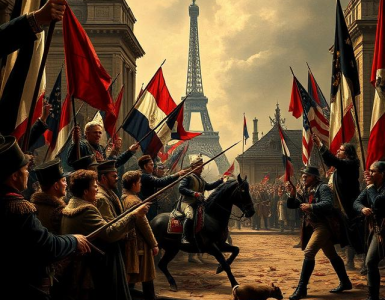History, as they say, is written by the victors. But what about the losers? What about the bystanders? The quirky coincidences and unforeseen consequences? Textbooks tend to focus on the broad strokes, the major players, and the neat, packaged narratives. But the real fun, the real *humanity* of history, lies in the details – the messy, chaotic, and often hilarious details that are usually swept under the rug.
Let’s delve into a few examples, shall we? Forget the grand pronouncements and sweeping generalizations; let’s get down and dirty with some of history’s more unexpected turns.
The Case of the Accidental Spy: The Great Molasses Flood
January 15, 1919. Boston. You probably associate this date with… nothing. Unless you’re a Bostonian with a morbid fascination for sticky disasters. That’s because on this fateful day, a massive tank containing 2.3 million gallons of molasses burst, unleashing a wave of treacle that swept through the streets at an astonishing 35 miles per hour.
Twenty-one people died, scores were injured, and buildings were demolished. It was a catastrophe, a sticky, sweet apocalypse. But here’s the twist often missed: the investigation revealed crucial failures in the tank’s construction and the company’s negligence. This accident, horrifying as it was, inadvertently exposed systemic problems in industrial safety regulations. It led to significant legal reforms and improvements in tank construction, inadvertently saving countless lives in the future (albeit with a rather grim lesson learned). Who knew a molasses flood could be a catalyst for progress?
The Potato’s Unexpected Role in the French Revolution
We all know the French Revolution was a tumultuous affair fueled by inequality, political unrest, and the Enlightenment ideals. But a contributing factor often overlooked is the humble potato. In the decades leading up to the revolution, the potato’s introduction to France significantly boosted the population. This boom, however, wasn’t evenly distributed. The rapidly growing population outstripped the food supply, intensifying existing problems and exacerbating social inequalities. The potato, ironically, may have played a significant role in setting the stage for the revolution’s explosive anger and social upheaval. A case of unintended consequences on a monumental scale.
The Unsung Heroes of the Space Race: The Women of NASA
When you picture NASA’s glory days, images of Neil Armstrong stepping onto the moon likely dominate. But the story of the space race is incomplete without acknowledging the brilliant, overlooked women mathematicians, engineers, and programmers known as “human computers.” These women performed complex calculations crucial to launch success—calculations done by hand with slide rules and incredible precision. Their contributions were often minimized or ignored, their stories relegated to the footnotes of textbooks. Their crucial role in getting those rockets into space is a testament to the fact that even the most “man-on-the-moon” achievements were the result of far more human effort than we usually give credit for.
The Curious Case of the “Accidental” Invention: The Microwave Oven
Percy Spencer, a self-taught engineer working for Raytheon, was testing a magnetron (a device used in radar) in 1945 when he noticed a chocolate bar in his pocket had melted. Intrigued, he experimented further, eventually leading to the invention of the microwave oven. It wasn’t a planned discovery; it was a happy accident, a delightful byproduct of military technology. It reminds us that breakthroughs often arise from unexpected places through seemingly trivial observations. So, next time you nuke a burrito, remember the curious story of how that technology came to be.
The “Oops” Moment That Changed Warfare: The Atomic Bomb
The bombing of Hiroshima and Nagasaki remains one of history’s most controversial events. The immediate devastation, the long-term effects of radiation—all are well-documented. But even within this grim landscape, there’s a quieter, less-discussed aspect that highlights how easily history could have taken a different path. There were miscalculations, miscommunications, and near misses during the Manhattan Project. A slight delay here, a missed signal there, and the course of history could have been dramatically altered. The sheer luck involved in the bomb’s effective deployment, amidst the technical complexities, almost feels surreal, underlining the haphazard, unpredictable nature of human history at its most brutal.
The Unexpected Legacy of a Failed Coup: The Russian Revolution
While textbooks often focus on the Bolshevik seizure of power, the February Revolution – the event that toppled the Tsar – was itself a remarkably unplanned affair. It started as a series of spontaneous protests, triggered by widespread food shortages and public discontent. The Tsar’s army, poorly led and demoralized, surprisingly sided with the revolutionaries, paving the way for the Tsar’s abdication. This initial uprising, fueled by hunger and frustration rather than a meticulously planned revolution, set the stage for the even more dramatic events that followed. It reminds us that major historical shifts can sometimes arise from seemingly chaotic and unpredictable circumstances.
These are only a few examples from the vast tapestry of historical events. By looking beyond the sanitized narratives, we can gain a richer, more nuanced understanding of the past. It’s in these unexpected twists, the overlooked details, and the improbable outcomes that we truly find the charm, the absurdity, and yes, even the lessons of history.
























Añadir un comentario